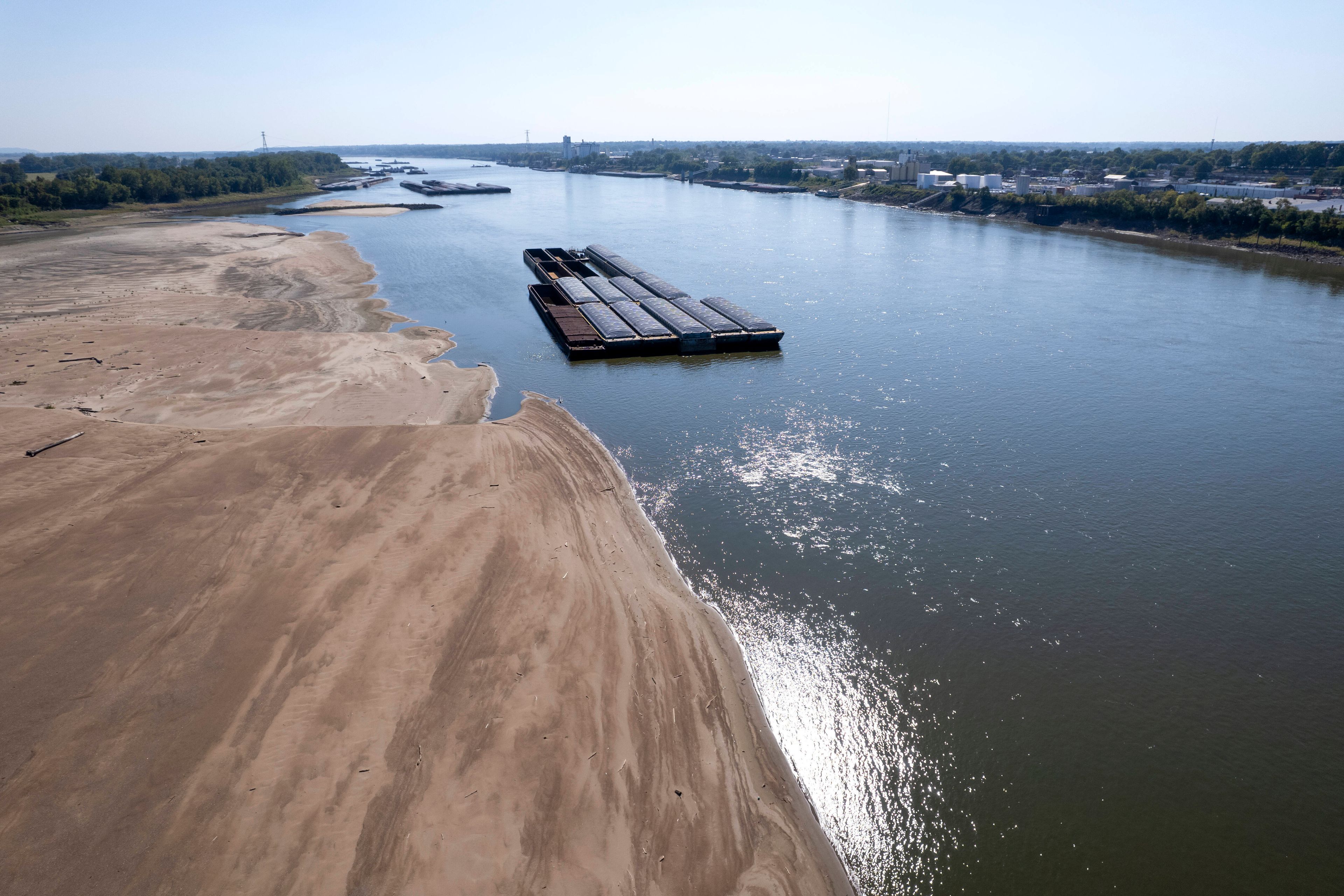Future of Missouri's water: Proposed legislation aims to curb out-of-state exports
Missouri aims to safeguard its water supply with new legislation to curb out-of-state exports. Local farmers and officials push for stricter regulations to protect resources from private corporations.
When it comes to water, Missouri’s current supply is solid. The water source outlook, even when drought occurs, is of the glass-half-full variety.
A growing number of Missouri farmers, politicians and government officials want to keep it that way.
Multiple studies looking at the state’s water supplies have shown that Missouri has enough water to meet the needs and demands of Missourians.
Many say Missouri’s water abundance could be vulnerable.
They worry that in the coming years, private corporations could export Missouri’s water to other states, which ultimately could harm those who live in Missouri, particularly farmers. Water can be exported through pipelines, which could be used to draw water out of the Missouri River, for example, or any of Missouri’s aquifers that supply enough water to irrigate and grow the crops harvested in Southeast Missouri. Officials say large canals could be built to siphon water from Missouri resources into neighboring states. Some companies are already exporting water across state lines.
Casey Wasser, the chief operating officer and senior policy director of the Missouri Soybean Association said regulating water exports is “the No. 1 priority to fix this upcoming session for our members.”
Jamie Burger, a state representative from Benton, and also the Republican assistant majority floor leader, proposed legislation last year that would put strict regulations on any developer or corporation seeking to pull from Missouri’s water supply and send it to other states.
“We were having a meeting with the (Missouri Department of Natural Resources) director, and I said, ‘What’s to keep people from moving water out of state?’ … He said, ‘Representative, I’ll have to get back with you on that.’ About two or three days later, he goes to my office and he said, ‘Right now, there’s nothing in play to keep water being pumped out of the state of Missouri.’”
Burger said a farmer in Arkansas wanted to pump water out of an aquifer in Southeast Missouri, “so that’s kind of where it came from.”
Much of the media focus statewide regarding Burger’s water export bill has been on the Missouri River, which spans the entire state’s width, and is the longest river in the nation. It begins its course in Montana and crosses several states before entering the Show Me State. Ultimately, the river flows into the Mississippi River near St. Louis. As a major tributary to the Mississippi, the Missouri affects water levels on the Mississippi River as well. The Mississippi River has dipped to low levels for the past several years. At times, barges have not been able to move goods on the river because of the low river conditions.
But a lot of water is also stored underground in Missouri aquifers, which can be tapped and directed from many places in the state. That’s not to mention the many lakes built in several areas of the state to control water levels and provide electricity.
“Right now, we’re shipping water from Joplin to the Native American casinos in Oklahoma,” Burger said. “We have another place around Kansas City that is shipping water to the state of Kansas. We have an area around St. Joseph that has a contract to ship water out of state.”
Burger proposed a water export bill last year that didn’t quite make it to the governor’s desk.
It had strong bipartisan support in the House, but stalled in the Senate, where a good amount of infighting among Republicans over hotly debated subjects stalled several initiatives, meaning the legislative body ran out of time to pass bills further down on the priority list. Burger’s bill moved out of the Agriculture, Food Production and Outdoor Resources Committee with a 6-1 vote.
The bill would essentially put the DNR, the Clean Water Commission, and Missouri Soil and Water District commission in charge of permitting any water exports, within certain limits. During the review process, the bill requires:
• There is water available in the amount specified in the application to export for water use outside Missouri.
• The applicant demonstrates a present need and intends to put the water to beneficial use. (In making the determinations of need and beneficial use, the director shall consider the availability of all water sources and other relevant matters.)
• The proposed use will not interfere with existing or proposed in-state uses, including recreational use.
• The water subject to the permit applications could feasibly be transported to alleviate water shortages in the state.
“Without this legislation, the floodgates are open to anyone who wants access to our precious resource,” said Wasser, the Soybean Growers Association executive. “While the legislation did not pass, we’ve positioned the bill to be a priority for this upcoming session, and we have educated many lawmakers on its importance. The bill will require anyone wanting to export water out of the State of Missouri to first apply for a permit with DNR. The DNR will take the permit application through a rigorous review process considering many factors. … This will give the public a chance to be heard on the permit request as well as provide for public representation by the commissioners, many of whom are farmers.”
Burger said the opposition to the bill was more about DNR's involvement in the initial part of the permitting than the idea of reducing water exports. Many Republicans dislike the regulatory power of the DNR more generally. Ultimately, Burger said, the DNR exists to handle this type of responsibility.
“Right now, there’s nothing to stop anyone from doing it, nothing, nothing at all, no oversight whatsoever,” Burger said.
Missouri officials have watched how battles over water in Western states have emerged as the population increased and the available water supply decreased for several years. Two of the largest reservoirs in the country dropped to alarmingly low levels, before a record snowpack in 2022 and a wet 2023 offered a reprieve. Seven western states, plus more than two dozen Native American tribes are battling over how water from the Colorado River should be dispersed, as well as what requirements should be met in terms of water conservation when water dips to dangerously low levels. Experts predict the water supply issue, especially in the West, will be a problem for the foreseeable future. It’s complicated, but the states operate within a system that allows for negotiating and gives avenues for jurisdictions to distribute the water strategically. Some speculate that such water wars could knock on Missouri borders in the future. Currently there is no mechanism to protect or negotiate water exports by the state of Missouri.
“Missouri is the furthest West state that falls under riparian water law,” explained Bob Bacon, state hydrologist with the Missouri Department of Natural Resources Water Resources Center. “Riparian water law is the state statute penned for reasonable use. So if you use and you push water on your neighbor, or deplete the resource of your neighbor, the one impacted by the use has the right to litigate in civil court. This type of water law system works really well in a system with ample water resources. In states that aren’t tremendously populous, you go further west, there’s a completely different water law called ‘prior appropriations’. So there’s a substantial amount of (regulations) that we don’t have in our state to protect water and to divide the water, or market the water out to users to avoid conflict. … It’s very different in those states out west under the prior appropriation system; they have a lot less access and water is less plentiful.”
Bacon said it’s not ideal for matters of water exports to be settled in civil court under riparian law, which looks at neighbor-versus-neighbor matters without considering larger statewide water issues. Bacon said Burger’s bill, filed as HB2153 last year, would be a start for protecting Missouri’s water supply.
Bacon said a U.S. Supreme Court decision in a case that pitted Texas and Oklahoma helped inform the language of the bill. Oklahoma had specific language in its statutes that prevented Texas from accessing water resources from Oklahoma’s supply to supply water to Dallas.
“The proposed legislation kind of puts our foot in the door in protecting our water resources,” Bacon said.
Connect with the Southeast Missourian Newsroom:
For corrections to this story or other insights for the editor, click here. To submit a letter to the editor, click here. To learn about the Southeast Missourian’s AI Policy, click here.











